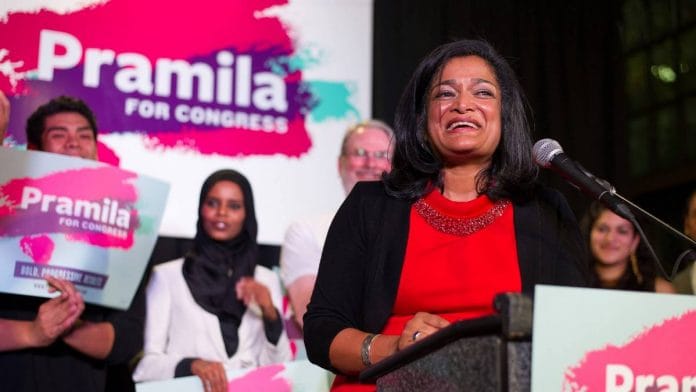New Delhi: Pramila Jayapal, the Indian-American Congresswoman from the Democratic Party, is making headlines for introducing a Congressional resolution last week, urging India to end the “remaining” restrictions in Jammu and Kashmir, which were put in place after the Narendra Modi government’s move to scrap Article 370 in August.
Jayapal, the first Asian-American to represent the state of Washington in the US Congress, has emerged as one of the leading progressive voices in the country’s politics. She is also a fierce critic of President Donald Trump and his policies. But politics wasn’t the first choice for the 54-year-old member of the US House of Representatives.
In the past three decades, Jayapal has donned many hats. After starting out as a financial analyst, she turned to the public sector, and eventually entered civil rights activism after the 9/11 attacks in 2001. Jayapal made her way to electoral politics in 2014, when she contested for a state senate seat and won by getting 51 per cent of the votes.
Activist-turned politician
Born in a Malayali family in Chennai in 1965, Jayapal spent her childhood in Jakarta and Singapore with her parents. Her father M.P. Jayapal was a marketing professional and mother Maya Jayapal a writer.
She later moved to the US and studied at Georgetown University, and did her MBA from Northwestern University. Jayapal then worked as a financial analyst in a stock brokerage firm before shifting to the public sector in 1991.
After the 9/11 attacks, the Congresswoman founded ‘Hate Free Zone’, an organisation advocating civil and immigrant rights, which also sued the George W. Bush administration to prevent the deportation of 4,000 Somalis.
Since she turned to full-time activism, Jayapal developed the image of an emerging progressive voice and, in 2014, she leveraged that image to contest for a Washington state senate seat.
Also read: Don’t be under illusion that India is a top priority for US. We’re not the ‘I’ in CRIMEAN
Her political journey
In 2016, Jayapal ran for the 7th Congressional District of Washington state, receiving 57 per cent of the votes and becoming the first Indian-American woman elected to the US Congress.
“Jayapal was an early Bernie Sanders supporter, but she endorsed Hillary Clinton after the primaries and worked hard for her election. She expected to go to Congress and be a force pulling President Clinton to the Left,” noted a report in The Nation.
Over the next couple of years, Jayapal would take up several progressive issues, and try and turn them into legislation.
With Sanders, she introduced the ‘College for All Act’ to make public colleges and universities tuition-free and to reduce student debt for working families.
She described it as an attempt to “piece back together the broken promises of a broken American Dream”. Jayapal also sponsored the ‘Domestic Workers Bill of Rights Act’ and ‘Medicare for All Act’ in the US Congress.
In June 2018, she was arrested along with 500 other women when they were protesting against the “cruel” zero-tolerance border policy of President Trump.
Part of the progressive caucus
Described by the Politico magazine as the “feisty freshman democratic lawmaker”, Jayapal is the co-chair of the Congressional Progressive Caucus, a group of liberal lawmakers which is the largest in the House Democratic Caucus.
By January 2019, Jayapal’s progressive image was so entrenched that a new batch of recently elected young-progressive Democrats lined up in the halls of the House of Representatives to greet her.
Along with young Democrats like Alexandria Ocasio-Cortez and Ilhan Omar, Jayapal is believed to be driving the Democratic Party in a new direction. These politicians champion the liberal agenda and have consistently spoken out against “persecution” of people — from Palestine to Kashmir.
Stance on Kashmir
In September, Jayapal along with senator James McGovern had written to US Secretary of State Mike Pompeo to “press” the Indian government to end restrictions in Kashmir.
She was also one of the key US Congress members who expressed their concerns over the human rights situation in Jammu and Kashmir during the House Foreign Affairs Committee hearings in South Asia in October.
Jayapal, along with 13 other Congress members, also raised issues related to the National Register of Citizens in Assam and the situation of minorities in India at the hearings.
The bipartisan resolution on Kashmir tabled by Jayapal in the US Congress urges the “Indian government to lift the remaining restrictions on communications and to restore internet access”.
It also demands the Indian government allow international human rights observers and journalists to visit Jammu and Kashmir, which is still facing an internet shutdown.
Jayapal said that detaining people without any charge, limiting communications and blocking neutral third-parties from visiting the region is harmful to US-India’s close and critical bilateral relationship.
Also read: Article 370 aided terror, 35A hurt investment: Modi govt’s defence for J&K decision in SC







Sorry, have to disagree. Did she ever table a resolution calling for US government to allow international observers in Guantanamo? I guess not, else we would have known. Indian community should stop supporting such politicians who will weaposnise their Indian identities for political gain, but will then do all they can to her the cause of India and Hindus. She belongs to the same club that Preet Bharara did. Sinister
Guantanamo!!!! You hit the bull’s eye. Selective outrage. It is like liberals taking a liking for Shiv Sena because it teams up with Congress and corrupt Pawar.
A woman of good conscience. Getting Ravi Batra to call her a “ liberal lunatic “ does not show our communication strategy in a good light.
US used Pak routes, bases, air space, intelligence inputs to stay in afg and in return Pakistan faced worst kind of terrorism, US love for India, more than 300 billion dollars economic loss. Why US saying this? They just don’t want to admit that they lost in Afghanistan and making Pakistan scape goat.